 Web Front-end
Web Front-end HTML Tutorial
HTML Tutorial In-depth study of the importance of HTTP status code 301 in website optimization
In-depth study of the importance of HTTP status code 301 in website optimization
A Deep Dive into HTTP Status Code 301: Why It’s Crucial in Website Optimization
In the world of the Internet, website performance and user experience are crucial. As part of website optimization, it is crucial to understand the role of HTTP status codes. One of the most important status codes is 301, also known as a permanent redirect. This article will explore the meaning of HTTP status code 301 and explain why it is crucial in website optimization.
HTTP status code is a digital code returned by the server to the client. These codes communicate to the client what happened during the interaction with the server, so the request can be handled accordingly. Different status codes represent different meanings. For example, a 200 status code indicates that the request was successful, while a 400 status code indicates that there was an error in the client's request.
301 status code refers to permanent redirection. When the server receives a request, if the URL has changed permanently, it will return a 301 status code. This means that the resource has been permanently moved to a new URL, and any previous references or links should be updated to the new URL. By using the 301 status code, the server tells search engines and users that the resource has changed location permanently, rather than being temporarily redirected.
So, why is the 301 status code so important in website optimization? First, a good website optimization needs to focus on improving user experience. When a user visits a website in a browser and finds that the returned status code is 301, he or she will be automatically redirected to a new URL. In this way, users can smoothly access the correct resources without encountering 404 errors (resource not found) or other errors. 301 redirects ensure that users do not enter dead links or invalid pages, thereby improving website usability and user satisfaction.
In addition, the 301 status code is also crucial to search engine optimization (SEO). When a search engine crawler visits a website, if the returned status code is 301, it will find that the resource has been permanently moved to a new URL. Search engine crawlers will remember this new URL and transfer the previous weight (PageRank) and index information to the new URL. In this way, the original URL and the new URL will be regarded as the same page by search engines, avoiding the problem of duplicate content. At the same time, 301 redirects also reduce the possibility of repeated indexing, thereby improving the website's ranking in the search engine results page (SERP).
In addition, 301 redirects can also help websites maintain links included by search engines. When a web page or an entire website needs structural or content adjustments, use a 301 redirect to direct old links to new links. In this way, whether it is an old link in the user's favorites or an old link referenced by other websites, it will be able to jump to the new page correctly, avoiding the problems of broken links and inconsistent information.
However, although 301 redirects are very important in website optimization, their abuse may also cause some problems. Frequently changing URLs and using 301 redirects can have a negative impact on your website's performance because each redirect requires additional communication from the server and client. At the same time, if 301 redirects are configured incorrectly, it may also cause loop redirects or other errors, causing the page to be inaccessible. Therefore, webmasters need to be cautious and follow best practices when using 301 redirects to ensure their correctness and effectiveness.
To sum up, the 301 status code plays a vital role in website optimization. By using 301 redirects, websites can ensure that users can access resources correctly and improve user experience. At the same time, it can also help search engines correctly index and rank the website, increasing the website's visibility and traffic. However, you need to be careful when using 301 redirects to avoid potential problems. Only by correctly configuring and using 301 redirects can they play their greatest role in website optimization.
The above is the detailed content of In-depth study of the importance of HTTP status code 301 in website optimization. For more information, please follow other related articles on the PHP Chinese website!
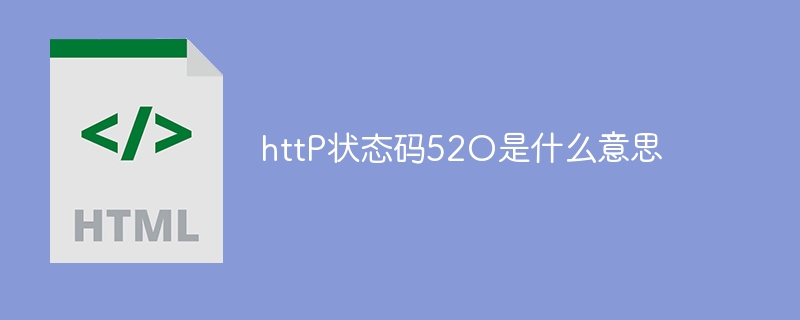 http状态码520是什么意思Oct 13, 2023 pm 03:11 PM
http状态码520是什么意思Oct 13, 2023 pm 03:11 PMhttp状态码520是指服务器在处理请求时遇到了一个未知的错误,无法提供更具体的信息。用于表示服务器在处理请求时发生了一个未知的错误,可能是由于服务器配置问题、网络问题或其他未知原因导致的。通常是由服务器配置问题、网络问题、服务器过载或代码错误等原因导致的。如果遇到状态码520错误,最好联系网站管理员或技术支持团队以获取更多的信息和帮助。
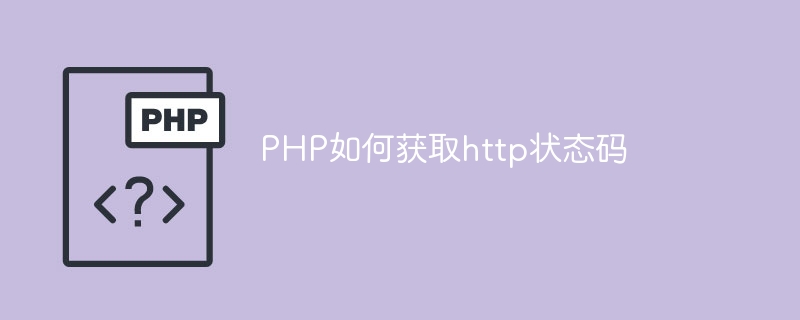 PHP如何获取http状态码Oct 07, 2023 pm 02:53 PM
PHP如何获取http状态码Oct 07, 2023 pm 02:53 PMPHP可以通过使用curl扩展和使用file_get_contents函数来获取http状态码。详细介绍:1、使用curl扩展,初始化curl会话,设置curl选项,执行curl会话,获取HTTP状态码,关闭curl会话;2、使用file_get_contents函数,发送HTTP请求,获取HTTP状态码。
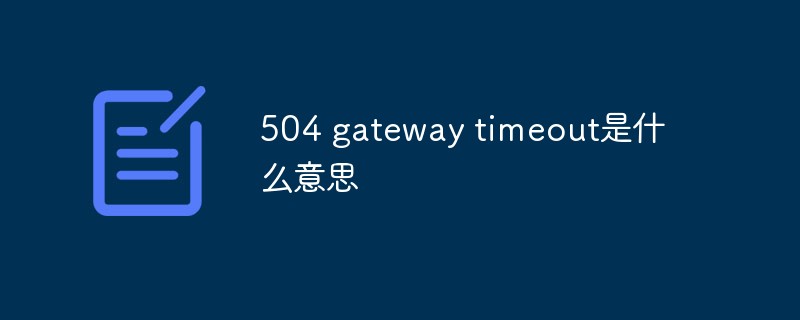 504 gateway timeout是什么意思Mar 02, 2023 pm 04:01 PM
504 gateway timeout是什么意思Mar 02, 2023 pm 04:01 PM504 gateway timeout的意思为“504网关超时”,是指服务器作为网关或代理,但是没有及时从上游服务器收到请求。504错误表示尝试为用户加载页面的Web服务器没有从其请求信息的其他服务器得到及时的响应。之所以称为504错误,是因为这是Web服务器用来定义此类错误的HTTP状态代码。
 PHP正则表达式实战:匹配HTTP状态码Jun 23, 2023 am 09:33 AM
PHP正则表达式实战:匹配HTTP状态码Jun 23, 2023 am 09:33 AMPHP正则表达式实战:匹配HTTP状态码在网站开发中,HTTP状态码是一个很重要的概念。根据HTTP协议规定,每个HTTP响应都应该包含一个3位数字的状态码,用于告诉客户端请求的处理结果。如果你正在使用PHP开发网站,那么掌握正则表达式来匹配HTTP状态码是很有用的技能。HTTP状态码的分类HTTP状态码按照首位数字分为以下5类:1xx:信息性状态码,表示服
 http状态码0表示什么Oct 18, 2023 am 10:15 AM
http状态码0表示什么Oct 18, 2023 am 10:15 AMHTTP状态码不包括0,如果在HTTP响应中看到一个以0开头的数字,那很可能是由于某种错误导致的异常情况或非标准的扩展,在正常的HTTP通信中,不会出现以0开头的状态码。
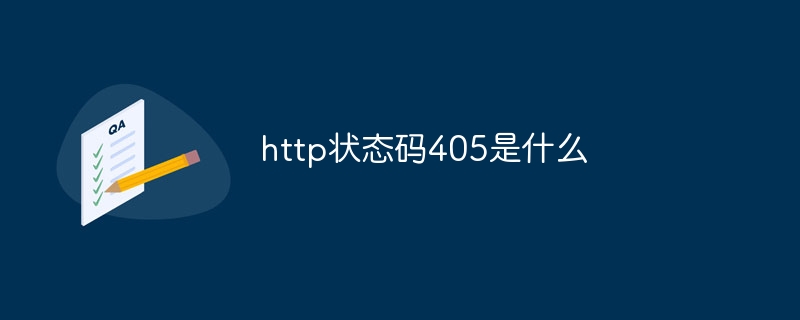 http状态码405是什么Dec 05, 2023 am 10:44 AM
http状态码405是什么Dec 05, 2023 am 10:44 AMHTTP状态码405表示 “Method Not Allowed”,即请求中指定的方法不被允许,通常发生在尝试使用不被允许的HTTP方法,如GET、POST、PUT、DELETE等访问特定的资源时。
 http状态码重定向是什么Oct 13, 2023 pm 03:22 PM
http状态码重定向是什么Oct 13, 2023 pm 03:22 PMhttp状态码重定向是指在客户端向服务器发送请求时,服务器返回的状态码为3xx的情况,当服务器收到请求后,根据不同的情况,可能会要求客户端进行进一步的操作,如访问其他URL,重新发送请求等,这种情况下,服务器会返回一个重定向的状态码,告诉客户端应该如何处理请求。常见的重定向状态码包括301、302、303、307等,它的使用可以帮助网站实现页面跳转、URL重写、负载均衡等功能。
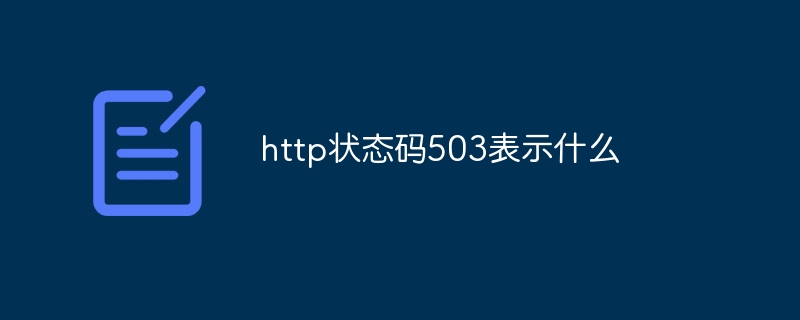 http状态码503表示什么Oct 18, 2023 am 10:24 AM
http状态码503表示什么Oct 18, 2023 am 10:24 AMHTTP状态码503表示服务器暂时无法处理请求,通常是由于服务器过载或维护而导致的,当服务器无法处理请求时,503状态码可以作为响应返回给客户端,503状态码是暂时性的,表明服务器暂时无法提供服务,一旦问题解决或维护完成,服务器将会恢复正常并返回其他适当的状态码。


Hot AI Tools

Undresser.AI Undress
AI-powered app for creating realistic nude photos

AI Clothes Remover
Online AI tool for removing clothes from photos.

Undress AI Tool
Undress images for free

Clothoff.io
AI clothes remover

AI Hentai Generator
Generate AI Hentai for free.

Hot Article

Hot Tools

PhpStorm Mac version
The latest (2018.2.1) professional PHP integrated development tool

DVWA
Damn Vulnerable Web App (DVWA) is a PHP/MySQL web application that is very vulnerable. Its main goals are to be an aid for security professionals to test their skills and tools in a legal environment, to help web developers better understand the process of securing web applications, and to help teachers/students teach/learn in a classroom environment Web application security. The goal of DVWA is to practice some of the most common web vulnerabilities through a simple and straightforward interface, with varying degrees of difficulty. Please note that this software

SecLists
SecLists is the ultimate security tester's companion. It is a collection of various types of lists that are frequently used during security assessments, all in one place. SecLists helps make security testing more efficient and productive by conveniently providing all the lists a security tester might need. List types include usernames, passwords, URLs, fuzzing payloads, sensitive data patterns, web shells, and more. The tester can simply pull this repository onto a new test machine and he will have access to every type of list he needs.

Safe Exam Browser
Safe Exam Browser is a secure browser environment for taking online exams securely. This software turns any computer into a secure workstation. It controls access to any utility and prevents students from using unauthorized resources.

MinGW - Minimalist GNU for Windows
This project is in the process of being migrated to osdn.net/projects/mingw, you can continue to follow us there. MinGW: A native Windows port of the GNU Compiler Collection (GCC), freely distributable import libraries and header files for building native Windows applications; includes extensions to the MSVC runtime to support C99 functionality. All MinGW software can run on 64-bit Windows platforms.





